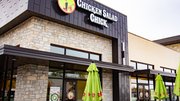Article
Legislative outlook: Health care reform
Executives and industry leaders keep a watchful eye on two health care reform bills that could change their operational landscape.

February 1, 2010
Fast casual operators may have breathed a sigh of relief when Scott Brown spoiled Democrats' plans for health care reform. But while the filibuster-proof majority may be gone, the legislation isn't dead, with Congressional leaders examining their options.
As the two versions of the bills now stand, operators have plenty to concern them. Essentially, the separate legislation passed by the House and Senate would require most employers to offer health care coverage to their employees. Independent operators and small franchisee businesses would be impacted the most, especially by the House version. In that one, a smaller number of operators — only those with payrolls under $500,000 — would be exempt.
To lessen the impact on the industry, especially its independent operators and smaller franchisees, theNational Restaurant Associationhas worked hard to fight for several key provisions. Those efforts have resulted in the Senate version including a provision for a 90-day waiting period, 60 days penalty-free, before an employer offers coverage. The waiting period would accommodate for the industry's high turnover rate, especially at fast casual and quick-service restaurants. The House bill does not have such a waiting period.
The NRA also has called for a change to the definition of 'full-time employee' to one that better fits the industry's flexible scheduling: 390 hours in a calendar quarter (13 weeks) as opposed to the standard weekly definition.
The association has pushed for as strong a small business exemption as possible. The Senate bill exempts businesses with fewer than 50 full-time employees from the mandate, a significant difference between the House's exemption of those with payrolls under $500,000.
Other provisions the association is lobbying for include an exemption for part-time and seasonal workers and maintaining the current regulatory framework of the Employee Retirement Income Security Act (ERISA) that allows large, multi-state employers to offer consistent health benefits to employees.
Chains concerned, too
Key differences in health care reform legislation |
House version:
Senate version:
|
Restaurant operators have been following the developments closely, some to see how their franchisees might be impacted and others for the national menu labeling standard included in both bills.
And a number of national brands, such as Panera Bread and Au Bon Pain, already offer health care coverage. According to the 2010 Fast Casual State of the Industry Report, 56 percent of operators said they offer medical insurance to hourly employees. Another 80 percent said they offer medical insurance to salaried employees.
While the offering of health insurance is a concern, a national standard for menu labeling is something operators would like to see happen.
"The most important thing for us is getting to a single, national standard for labeling," said Ed Frechette, Au Bon Pain's senior VP of marketing. "As more and more cities and states develop their own standards, we see slightly different requirements that will make our menu and label development more complex. If we can get to a uniform standard across the country, it will be a lot easier for us to conform."
Frechette said that when the company made its menu switch in New York City to post calories, it did not see big swings in sales. "So labeling vs. not labeling is not a major concern for us," he said.
Rick Sampson, president and CEO of the New York State Restaurant Association, said that as more cities, counties and states pass menu labeling requirements, a national standard for menu labeling is welcome.
When local or state legislators mandate such laws, they seem to have little consideration for the changes that large chains like McDonald's and Subway must undergo for one market, he said. But even a national program means more expenses for operators.
Cost is the primary reason most operators do not already offer health care plans for their employees. Some independent operators cannot even afford the coverage for themselves, he added.
"If health care was affordable, small businesses would absolutely make it available to employees because it's just good business," Sampson said. "[They] want to keep these people."
Operators fear the impact of taking on additional expenses — potentially an additional 8 to 10 percent to offer health coverage — when they already are facing some of the toughest economic challenges in recent memory.
Sampson said he has had a number of operators express their concern over the legislation, especially the health care portion. Essentially, they fear the extra operating expense will push their businesses to the breaking point.
"I have had restaurants report back to me that if this goes into effect, 'I will have to close my doors,'" he said. "This industry is so sensitive to raising prices because the public has a choice. They don't have to eat out. They can stay home."
 ChatGPT
ChatGPT Grok
Grok Perplexity
Perplexity Claude
Claude












